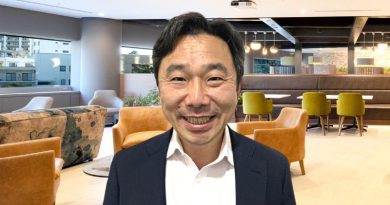Interview – Scott Treloar: “The alternative investment industry needs revolution rather than evolution”
HFC boss Stefan Nilsson talks with Noviscient CIO Scott Treloar in Singapore about how to reimagine investment management, putting investors first, digital infrastructure, revolution vs evolution and teaching the next generation of portfolio managers. Scott set up Noviscient in 2016. Prior to that he was Portfolio Manager and Chief Risk Officer at Vulpes Investment Management and has prior experience from Deutsche Bank. He started his career in Australia with Macquarie Bank, Novalis Capital and Committed Capital.
You launched Noviscient in 2016 to address the challenges of selecting managers with skill and combining their strategies to create customised solutions for investors. Tell us about your first few years on this entrepreneurial journey.
Our mission is to “reimagine investment management.” The challenge is how to build a transparent market for skills to allow investors to access those emerging fund managers generating excess returns. So, we spent the last few years developing a platform model to source, select and allocate capital to global emerging managers. But we do it in a particular way. Rather than sending our investors’ capital out to these emerging managers, we get them to send their trading strategies to us and we execute on their behalf. It is an open partnering arrangement. We are a fund manager without fund managers. There are two major benefits to this approach: 1) we remove counterparty risk and hence the need for slow and costly operational due diligence on the emerging managers – the capital never leaves our platform; and, 2) we are now working with and risk managing our emerging managers in real-time and providing transparency and control to our investors. We see what we are doing as industry-changing. The vision is to digitise the whole investment management value chain to provide better, faster, cheaper solutions for our investors. This is not a trivial undertaking and we have put a lot of effort into our platform and algorithms, from capital raising to investing to reporting. In parallel, we are building a community of emerging managers, service providers and investors that believe, as we do, that there must be a better way for the industry to operate – one that genuinely puts investors first.
Low cost for investors is something you seem focused on. How does Noviscient achieve that while still being able to build a viable business?
While investment management is all about information, it currently operates in a physical, offline way. Information is managed by legacy technology and held in the form of pdfs, emails, checklists and in people’s heads. Imagine if we could operate in a fully digital mode. Managers, investors and service providers linked by APIs. Information held in online databases. A fully online process of governance, investing and reporting. We think this may not be feasible for incumbent fund houses with their vintage technology and offline processes, but for new entrants with the advantages of cloud capabilities and open-source software, it is absolutely possible. We are doing it better, faster, cheaper. My COO says I should not say we are “cheap”. But I don’t mind being cheap. There is a massive wedge between the cost structures of online and offline businesses. By being online and benefiting from platform economies of scale, we operate at around 25% of the equivalent unit cost compared with incumbents. Further, it allows us to charge performance fees rather than management fees. This aligns with our mentality of creating value for clients and sharing in some of that value (performance fees), rather than transferring value from clients (management fees).
What can you tell us about your new “fund in a box” initiative?
Our digital infrastructure, linked with our use of Singapore’s VCC initiative, allows us to set up and operate new funds very quickly and cheaply. Some of our emerging manager partners have investors looking to allocate capital specifically to their strategies. But they don’t want to have the costs and time lag of setting up their own fund. They have been asking if we can help them. Hence, we started working on this “fund in a box” initiative, which allows us to set up a fund vehicle quickly and far more cheaply with all the benefits of being online – transparency, real-time reporting and so on. Essentially, we partner with them. They focus on strategy generation and we provide robust infrastructure. Managers can start to build a track record with a much lower AUM, from $10m, on a modern platform with quality support. We remove the major frictions encountered by new managers when trying to get started in this industry.
How do you think the alternative investment industry will evolve after the global pandemic gets under control? Are trends such as remote working here to stay?
I think the alternative investment industry needs revolution rather than evolution. Remote working is just a start. The current investment management model is from the 20th century. Big fund houses focused on growing AUM through marketing and distribution arrangements. Structural and economic frictions are blocking capital allocation to those emerging managers generating stronger returns. It is not delivering the performance, alignment or transparency that investors want. Instead, I see an ecosystem of specialised emerging managers focused on generating alpha and connected via APIs to platforms providing execution and reporting infrastructure. At the same time, the traditional fund houses will give way to a small number of large, low-costs market/factor firms offering exposure to risk premia at scale. And finally, robo-advisors will transform into “integrators” that elicit investor requirements and construct solutions using the alpha and risk premia components mentioned above. And that will be it. A smaller, more focused, value-creating industry. Ineluctable, but it will take some time.
You have been sharing your investment management expertise by lecturing at Singapore Management University and Henley Business School. Why do you enjoy teaching?
I find teaching smart quantitative finance students helps me learn and at the same time I can provide the students with some of my experiences across investment banking and asset management. I am a sort of non-traditional professor, but they seem to like it.
What skills do you think are the most important to have for people who want to succeed in investment management in the coming years?
The first I think is attitude. I see investment management as hopefully becoming more of a profession focused on creating value for our clients (investors) and less on individuals becoming wealthy. That is stewardship over salesmanship (a reference to the book “Enough” by John Bogle). At the end of the day, someone is “successful” if they can contribute to their field and to others, not if they end up with the most money – although this is not necessarily a universal opinion, I know. More technically, investment management professionals will need skills in data engineering and analytics. At the high end, it will be skills involved in modelling the dynamics of financial markets while appropriately handling the variability and uncertainty. I also see sequential decision-making (stochastic optimal control/reinforcement learning) as becoming more and more important. In short, we must move on from marketing and relationship management to a more professional, data-driven industry that is characterised by an “investor-first” mentality.









